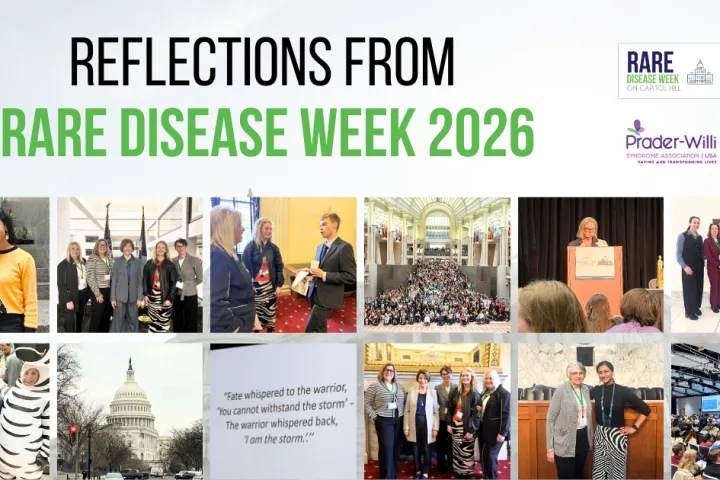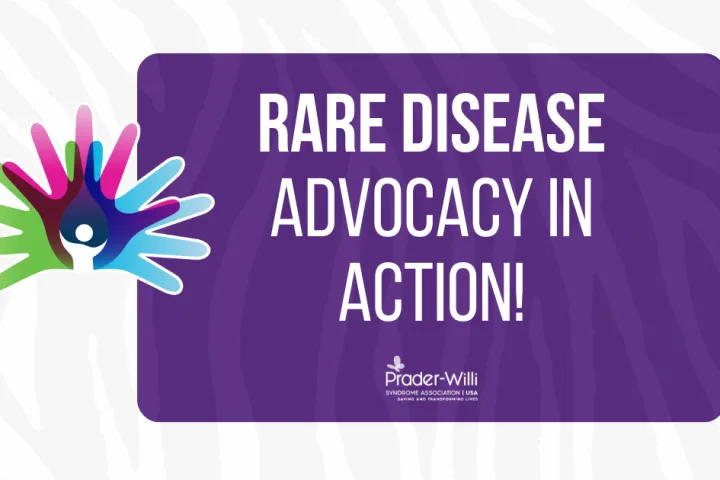Persons with Prader-Willi syndrome (PWS) will work hard to earn your praise for a job well done. Given the correct environmental structure and supports, someone with PWS can be one of your hardest working and valued employees.
When it comes to tasks like sorting, shredding, adhering stamps onto cards, repetitive responsibilities of this nature, and some computer work, employees with PWS often have tremendous patience and perseverance, often more so than other workers.
Prader-Willi syndrome is a rare and complex medical disorder that affects an important supervisory center in the brain that controls many functions of the body including muscle strength, growth, metabolism, appetite regulation, and the management of emotions. Beginning some time in childhood, the brain fails to regulate appetite normally. For the individual with PWS there is a constant preoccupation with food accompanied by an unrelenting, overwhelming physiological drive to eat called hyperphagia. Normal satiety — the feeling of fullness after eating – does not exist no matter how much food is eaten. The metabolic rate is about half what it should be, so individuals with PWS can gain a great deal of weight in a very short period of time causing morbid obesity and life-threatening stomach or bowel complications.
There is currently no known medication that will control or even reduce the drive to eat, though research is making great progress toward developing a medication specifically for persons with PWS.
When access to food is secure and managed well, the individual with PWS can focus on the task at hand and perform a job well done. Simple changes can include keeping employees’ lunches and other food items in a manager’s office or some other secured area and limiting access to vending machines and money that can be used to purchase food items from the cafeteria, mobile food trucks, local fast-food restaurants. On work sites where restricting access to food with locks is not feasible or where the individual with PWS has a history of eloping, one-to-one supervision will be necessary.
Employers who able to make the relatively minor changes to accommodate their employee with PWS will find they have invested in a productive and valuable employee.
The Prader-Willi Syndrome Association (USA) is a non-profit organization dedicated to serving persons with PWS and their families. PWSA (USA) will provide information to employers who hire someone with PWS and help you create an environment in which your employee with PWS can thrive and be a productive employee. Working together, we are saving and transforming lives.
For more information about Prader-Willi syndrome or to speak with someone about how to organize your worksite to help your employee with PWS, contact PWSA (USA) at 800-926-4797 or info@pwsausa.org or visit www.pwsausa.org.





 Perry A. Zirkel has written more than 1,500 publications on various aspects of school law, with an emphasis on legal issues in special education. He writes a regular column for NAESP’s Principal magazine and NASP’s Communiqué newsletter, and he did so previously for Phi Delta Kappan and Teaching Exceptional Children.
Perry A. Zirkel has written more than 1,500 publications on various aspects of school law, with an emphasis on legal issues in special education. He writes a regular column for NAESP’s Principal magazine and NASP’s Communiqué newsletter, and he did so previously for Phi Delta Kappan and Teaching Exceptional Children. Jennifer Bolander has been serving as a Special Education Specialist for PWSA (USA) since October of 2015. She is a graduate of John Carroll University and lives in Ohio with her husband Brad and daughters Kate (17), and Sophia (13) who was born with PWS.
Jennifer Bolander has been serving as a Special Education Specialist for PWSA (USA) since October of 2015. She is a graduate of John Carroll University and lives in Ohio with her husband Brad and daughters Kate (17), and Sophia (13) who was born with PWS. Dr. Amy McTighe is the PWS Program Manager and Inpatient Teacher at the Center for Prader-Willi Syndrome at the Children’s Institute of Pittsburgh. She graduated from Duquesne University receiving her Bachelor’s and Master’s degree in Education with a focus on elementary education, special education, and language arts.
Dr. Amy McTighe is the PWS Program Manager and Inpatient Teacher at the Center for Prader-Willi Syndrome at the Children’s Institute of Pittsburgh. She graduated from Duquesne University receiving her Bachelor’s and Master’s degree in Education with a focus on elementary education, special education, and language arts. Evan has worked with the Prader-Willi Syndrome Association (USA) since 2007 primarily as a Crisis Intervention and Family Support Counselor. Evans works with parents and schools to foster strong collaborative relationships and appropriate educational environments for students with PWS.
Evan has worked with the Prader-Willi Syndrome Association (USA) since 2007 primarily as a Crisis Intervention and Family Support Counselor. Evans works with parents and schools to foster strong collaborative relationships and appropriate educational environments for students with PWS. Staci Zimmerman works for Prader-Willi Syndrome Association of Colorado as an Individualized Education Program (IEP) consultant. Staci collaborates with the PWS multi-disciplinary clinic at the Children’s Hospital in Denver supporting families and school districts around the United States with their child’s Individual Educational Plan.
Staci Zimmerman works for Prader-Willi Syndrome Association of Colorado as an Individualized Education Program (IEP) consultant. Staci collaborates with the PWS multi-disciplinary clinic at the Children’s Hospital in Denver supporting families and school districts around the United States with their child’s Individual Educational Plan. Founded in 2001, SDLC is a non-profit legal services organization dedicated to protecting and advancing the legal rights of people with disabilities throughout the South. It partners with the Southern Poverty Law Center, Protection and Advocacy (P&A) programs, Legal Services Corporations (LSC) and disability organizations on major, systemic disability rights issues involving the Individuals with Disabilities Education Act (IDEA), Americans with Disabilities Act (ADA), and the federal Medicaid Act. Recently in November 2014, Jim retired.
Founded in 2001, SDLC is a non-profit legal services organization dedicated to protecting and advancing the legal rights of people with disabilities throughout the South. It partners with the Southern Poverty Law Center, Protection and Advocacy (P&A) programs, Legal Services Corporations (LSC) and disability organizations on major, systemic disability rights issues involving the Individuals with Disabilities Education Act (IDEA), Americans with Disabilities Act (ADA), and the federal Medicaid Act. Recently in November 2014, Jim retired.